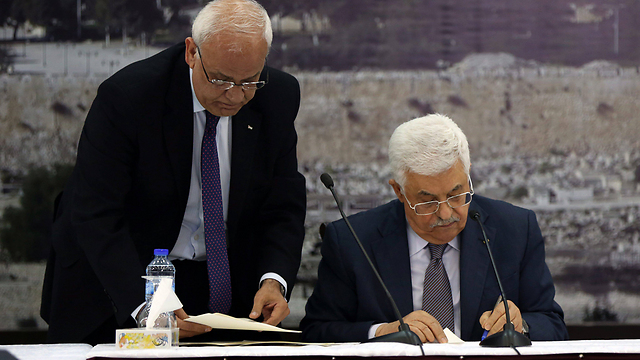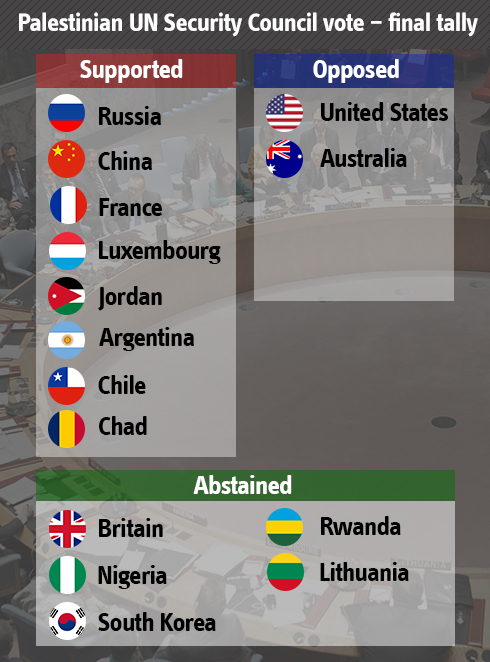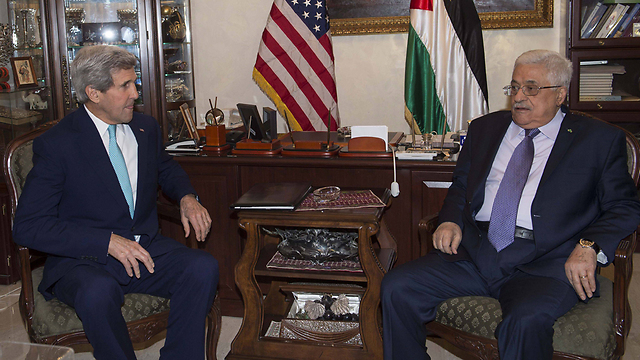
Abbas has good reason to smile.
Photo: AFP
Despite criticism for the failure at the UN, Palestinian President Mahmoud Abbas is hiding a smile of satisfaction under his mustache.
His people are proud of him after all, the Americans are sighing with relief, and even Israel can't complain, as it will take time before any war crimes-related legal procedures will be put into motion.
Abbas is gleefully rubbing his hands as the curtain closes on the diplomatic duel between Israel and the Palestinians over the last two days.
He was content Wednesday after signing the Rome Statute, paving the way for membership in the International Criminal Court in the Hague, just as he was satisfied a day earlier, after the UN Security Council vote on "ending Israeli occupation", when headlines across the globe screamed that the Palestinians had suffered a defeat.
Behind the UN vote:
Itamar Eichner
Analysis: How US helped lead blitz to torpedo unilateral Palestinian resolution in UN Security Council, and how a phone call helped Nigeria's surprising change of heart. 'There was a clear message from international community to the Palestinians: Do not try to use tricks to replace negotiations,' official says
The US has sent direct and indirect signals in recent weeks, on the one hand, that any unilateral diplomatic move by Abbas would affect Israel's election. In other words, the Americans conveyed to him that doing so would give ammunition to the Israeli right and bolster its support. On the other hand, the Palestinian public – together with some of their leaders – pushed him the other way, demanding to see action after so many threats and promises.
Mere days separated the balanced lineup in the Security Council this last week and the clearly pro-Palestinian composition that will come into being next week, which would provide them with a solid majority without great effort. Despite that, the Palestinians insisted that the vote on their draft resolution take place before the end of 2014.
"We had a majority, but at the last minute one country backed out of their support," Abbas said Wednesday in Ramallah, but it seems that he also knew there was a quite reasonable chance of the vote being defeated in the council's present configuration.
So why is he pleased? Because he arrived yesterday at a meeting of the Palestinian leadership with his head held high, aware of the fact that he went all the way with determination, without surrendering to pressure and without bending to the demands. The Palestinian public cannot reproach him.
He also managed to avoid an American veto, which would have embarrassed the United States, forcing it to reject a proposal for the two sides to reach a two-state solution on the basis of the 1967 borders – a formulation it publicly supports. Now the Americans can't reproach him, either.
He convened a theatrical, lavish meeting in Ramallah yesterday, covered live on television, in which he signed 20 international agreements, most importantly the Rome State, to the sounds of applause from attendees sitting in the reception hall.
If you ask the average Palestinian, he'll say that the Palestinians joined the International Criminal Court yesterday. Abbas, with Saeb Erekat at his side, made sure to underscore these words during the signing ceremony. But this is untrue: The Palestinians have indeed signed the Rome Statute, which paves their way to possibly join the ICC, but the road from Rome to The Hague is long, and if they wish, the Palestinians can make sure that it gets a little longer.
The ICC is the Palestinians doomsday weapon, alongside putting an end to security cooperation, and it's well-known that such a weapon is used only when other options have been exhausted. Speaking of which, threats to stop cooperation on security were and remain meaningless. The level of security coordination between Israel and the Palestinian Authority is the strongest it's been since its start in 1994.
So the Americans are a little disappointed (albeit pleased to avoid a veto), and some in Israel voice a little anger (because they must and because there are elections), and the Palestinian citizen is happy from its strong leader (who didn't blink), and Abbas, as is his way, is trying to walk between all the raindrops and stay dry. So far, he's not doing badly at all.


















